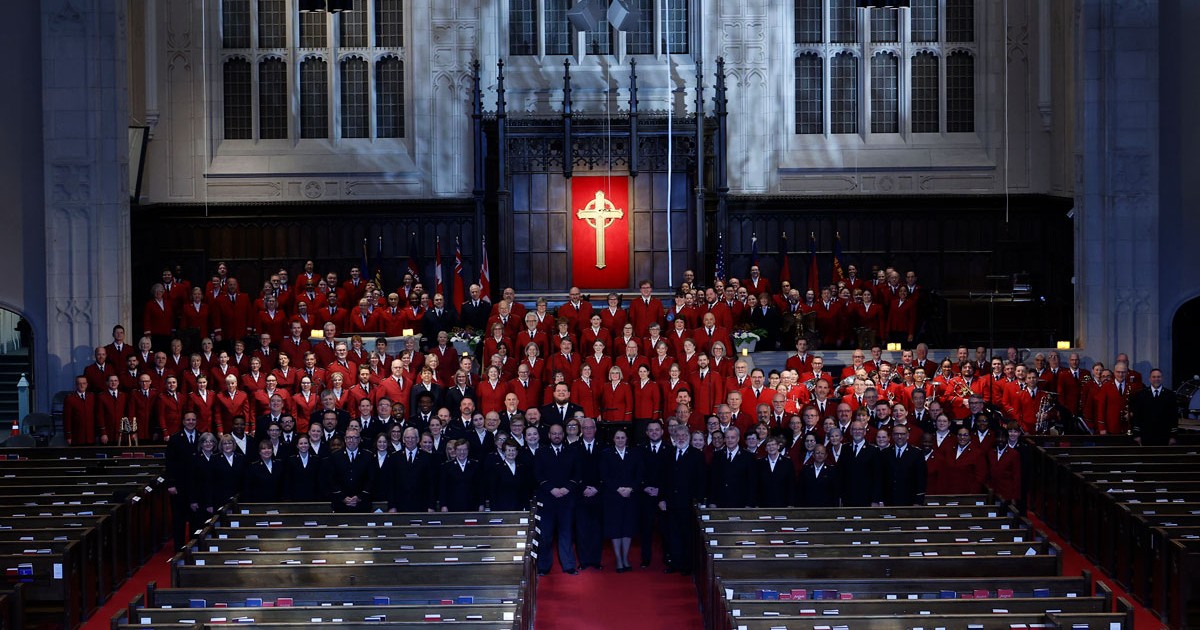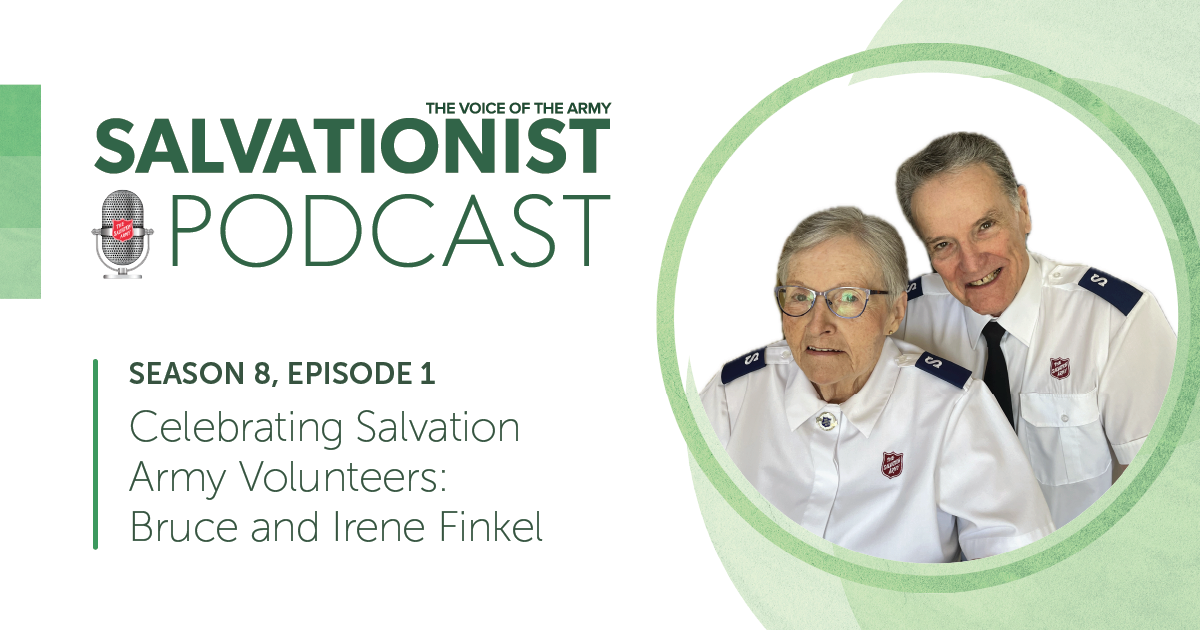 This month the international leaders of The Salvation Army meet to elect a new General (click here to read more). When it comes to the international Salvation Army, my position is similar to that of a flea on an elephant's ear. From where I stand, the view is grey and fuzzy, and somewhat precarious. I cannot see the whole elephant.
This month the international leaders of The Salvation Army meet to elect a new General (click here to read more). When it comes to the international Salvation Army, my position is similar to that of a flea on an elephant's ear. From where I stand, the view is grey and fuzzy, and somewhat precarious. I cannot see the whole elephant.
Now, if I were the General, I'd probably be able to see the whole animal. I'd be able to step back—way back—and get a picture of the entire organization. If I were the General, I'd be able to see the Army's true strength. I'd have a good idea of its size. I'd have a vision of what it is capable of.
Of course I'm not the General, and never will be, so I have to be content with my place on the elephant's ear. But this is not a bad place because, from time to time, it allows me to whisper some ideas and comments in the hope that someone is listening (or, in this case, reading).
As I see it, the General first of all has to have that big picture of the Army. He or she has to have a great appreciation of its history, doctrines, practices and capabilities. He or she has to be able to see things from a different perspective than the rest of us.
Most will be familiar with the Indian fable of the six blind men who went to visit an elephant. The fable was put into a poem by John Godfrey Saxe (1816-1887) in which each blind man described the elephant as he perceived it. The one who touched the elephant's sides described the elephant as a wall. The one who touched the knee thought the elephant was like a tree. The one who touched a tusk perceived the elephant as spear-like. The man at the trunk thought the elephant was like a snake. The man near the ear thought the elephant was like a fan, and the one at the tail described the elephant as being like a piece of rope.
That, I think, is how most Salvationists perceive the Army. We live and work in our small corner of it and develop our perceptions according to our personal encounters with the organization. The General, on the other hand, has to be able to see the whole. His or her perception of the organization must be both complete and accurate.
I said that if I were the General I could step back and see the whole animal. The problem is that the farther one steps away from the elephant, the harder it is to see the details. And from a distance everything is beautiful. But for those living in their particular wrinkle, things are somewhat different. Like watching high definition television, those close to the action see the blemishes, sores, wounds and scars. The flea on the elephant's ear can see that the old pachyderm is going deaf. The flea on the elephant's trunk can see that there's a cavity in the elephant's molar that is causing him a lot of pain. The flea on the elephant's back is aware of the cancerous growth that could even result in death.
While the international leader of The Salvation Army has to have a “general” picture of the organization, he or she must also be very aware of what is happening close up. The General has to be conscious of where the organization is hurting and be prepared to address the pain. He or she has to know where the wounds are and know how to bring about healing. He or she has to know what it is like for ordinary Salvationists trying to live out their faith in various parts of the world, and for the rank and file officers working out their covenant in their particular ministry.
The General of The Salvation Army is like an Indian mahout (the driver and keeper of the elephant) in that the General sits at the organization's head. The mahout is the one who guides the elephant. He is the one who decides which direction the elephant is to go in and what work the elephant is to do. So it is with the General. He or she has the greatest influence in deciding the direction and ministry of the Army in the years ahead.
It is a known fact that elephants have poor eyesight. They can see clearly only about 20 metres in front of them. Our organization has sometimes been noted for its short-sightedness. However, the General, from his or her position at the head, can see farther than anyone else. Therefore the General must be a visionary. He or she must see what others can't and dare to go in the strength of God where no one has gone before.
George Bernard Shaw once said: “Some men see things as they are and ask why. I dream things that never were and ask why not.” That is the kind of person the General of The Salvation Army must be. That is the kind of person William Booth was. I do not envy those who will gather to elect a new General. Theirs is a daunting task. As they debate the big issues that face our organization, I pray for them. I pray that they will see farther and with more clarity than any among us what God wills for the Army—certainly a lot farther and clearer than this flea living in the third wrinkle behind the right ear.
 Major Fred Ash is the corps officer at Burlington Community Church, Ont.
Major Fred Ash is the corps officer at Burlington Community Church, Ont.
If I Were the General …
I would implore every Salvationist to live out the prophetic calling of Isaiah 58―to make justice, mercy and love an extension of our lives—a holiness that is lived out. I'd join in Booth's adventurous beginning of justice and evangelism through empowering women, in the ranks and in society, toward winning the world for Jesus. I'd abandon traditionalism for the primitive spirit of Salvationism to flourish in our day and in a way that matches “blood and fire” with context and meaning. I'd trade in ranks, formal uniforms and instruments if necessary for fire, prayer, spiritual hunger, courage and daring.
Major Danielle Strickland
Edmonton Crossroads Community Church
I would place a renewed focus on camping ministries, ensuring they are properly and adequately funded. I would also emphasize soldiership, encouraging the progression from junior to senior soldiership ranks and growth from friend to adherent to soldier.
Arlene Riche
St. John's Temple, N.L.
I would encourage and equip lay Salvationists, especially in financially independent territories, to commence the Army's work in communities where our flag has never flown. This would involve living and working in a neighbourhood while, at the same time, developing a core group of Salvationist disciples who would begin the process of planting a new Army faith community. “Opening fire” in new places is not exclusively the job of officers; battles are fought and won by our soldiers.
Lieutenant Robert Jeffery
Spryfield Community Church, N.S.
I would not move territorial commanders, divisional leaders and officers so often. This would greatly assist our ability to transform vision into action. History demonstrates that there is a strong link between consistent long-term leadership and growth.
Glenna Cryderman
Saskatoon Temple
I would focus corps leadership on further developing programs for young children. Young children have young families and young families offer hope and a future for Army corps.
David Williams
St. John's Temple, N.L.









place greater emphies on the Purse than on the Soul...on the JUNGEL BEAT IN OUR HOLINES/SALVATION MEETINGS..LINE DANCING THAN DANCING IN THE SPIRIT..ATTIRE WHICH NO LONGER INDENTIFIES AS "SERVANTS OF GOD"..WE ARE NO
LONGER "A ARMY MARCHING AS TO WAR,BUT AN ARMY IN RETREAT"
Major Fred,now that you have Hit the Nail on the Head,DRIVE IT HOME !!!
GOD Bless.
Walter Boland